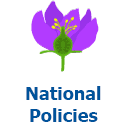 Every country has developed, formulated, and decreed national policies related to rural advisory services. Find some examples here. If you are looking for a national policy from a specific country, please use the search function, selecting the category “National policies” and the tag for the country.
Every country has developed, formulated, and decreed national policies related to rural advisory services. Find some examples here. If you are looking for a national policy from a specific country, please use the search function, selecting the category “National policies” and the tag for the country.
Women in Post-harvest Activities: Understanding their Health and Nutrition Behaviour
Bangladesh is a country with mainly paddy-based agriculture, which has managed to triple its rice production since independence in 1971, from 10 million metric tons to over 33.83 million metric tons (Krishi Dairy in Khatun, 2015). 76% of the country’s people live in the rural areas and 90% of them have livelihoods directly related to agriculture (Dev et al., 2014). From this perspective, rural women’s participation in post-harvest activities are one of the most important contributions in agricultural production in Bangladesh. However, in traditional Bangladeshi context, post-harvest work is simply seen as part of women’s household responsibilities; in other words, this work has little monetary value or social recognition. Though this scenario has been changing due to the new technological intervention and frequent market affiliation with rice production and processing, nowadays many women are working in mills (usually called rice mills) as cheap and conventional labour for their livelihood. In this aspect, the aim of this study is to explore the health and nutritional behaviour of rice mill women workers in Narina Union of Shahjadpur.

